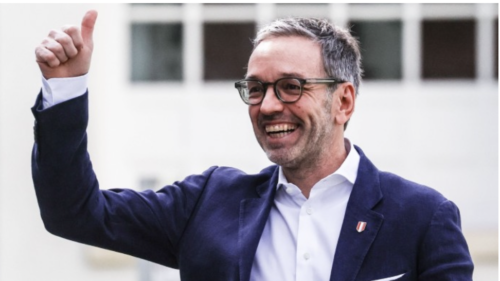Since 1945, Europe, given its history of totalitarian, authoritarian, fascist and Nazi extremist movements early in the 20th century, has been reluctant to elect the hard-right. Yet, the past decade has seen populist conservatives from Fidesz in Hungary to the Law and Justice party in Poland take power across the continent.
Austria, the country most closely associated with European extremism, has now joined their ranks. Herbert Kickl, of the Freedom Party (FPÖ), garnered 29% of the vote in the September 29th election.
Most mainstream parties, both in Austria and abroad, are mistrustful of Kickl and the FPÖ. In 2019, when Kickl was interior minister, major NATO allies stopped sharing some sensitive intelligence with Austria, for fear that it would end up in the hands of Vladimir Putin, of whom Kickl is an admirer.
Unlike right-wing parties in other European countries like Italy, which have attempted to disavow their fascist roots, Kickl alludes to them and capitalizes on them. He says that he wants to govern as a Volkskanzler: a one-time title of Adolf Hitler’s. The left believes that his campaign slogan alludes to the phrase Dein Reich komme –– another reference to the Nazis. The list goes on. On September 28th, a leaked video showed FPÖ politicians singing a former SS anthem at a funeral. Additionally, Kickl has promised to turn Austria into a “fortress” against immigration.
Despite the outrage in Brussels at Kickl’s victory, it is unlikely that the FPÖ will be able to make good on its promises. They lack an outright majority and so require a coalition partner to put Kickl in office. Other parties, including the center-right ÖVP, have created a cordon sanitaire and will probably refuse to let the FPÖ take power. That means that Austria will likely break with years of precedent to build a coalition that is not led by the top party. A similar fate met Geert Wilders, a Dutch right-winger who won an election last year but was unable to take power.
This course carries its own risks. Kickl, like the populist right across Europe, says that the wishes and concerns of his constituents have long been ignored by an elite clique of establishment politicians. Excluding the FPÖ from power runs the risk of lending credence to these claims and allowing the party to claim an absolute majority in the next cycle. However, an Austria with Herbert Kickl in its highest office is one that risks exclusion from the EU and security compacts.
Perhaps the best option for Austria is a curious coalition in which the FPÖ and ÖVP share power, but with the FPÖ as a junior partner. This would be a matchup as fractious as Austrian politics unlikely to last. But it is surely better than “Fortress Austria.”






